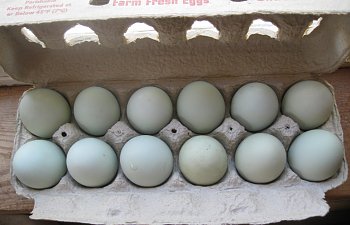So you want to hatch yourself some chicks and you’re ready to collect eggs and toss them in the incubator. Wait! There are some things you should know to maximize your success and get the most out of your hatching eggs.
Fertilization
Need pure eggs? Better make sure all your breeds are separate! Even if one rooster is dominant and you never see the others mate, don’t be fooled! They’re getting up to some funny business when you (and top roo) aren’t watching, I guarantee it. And make sure your hens are penned with the rooster you want to father your chicks for at least four weeks before you start to hatch if she’s been around another roo – yes, they can store sperm that long!
Selecting Eggs to Hatch
Porous egg, not good for hatching.
Storage
Shipped Eggs
And of course, the best way to be sure that you get a good hatch is to make sure your parent birds are happy, healthy, and well-fed!


